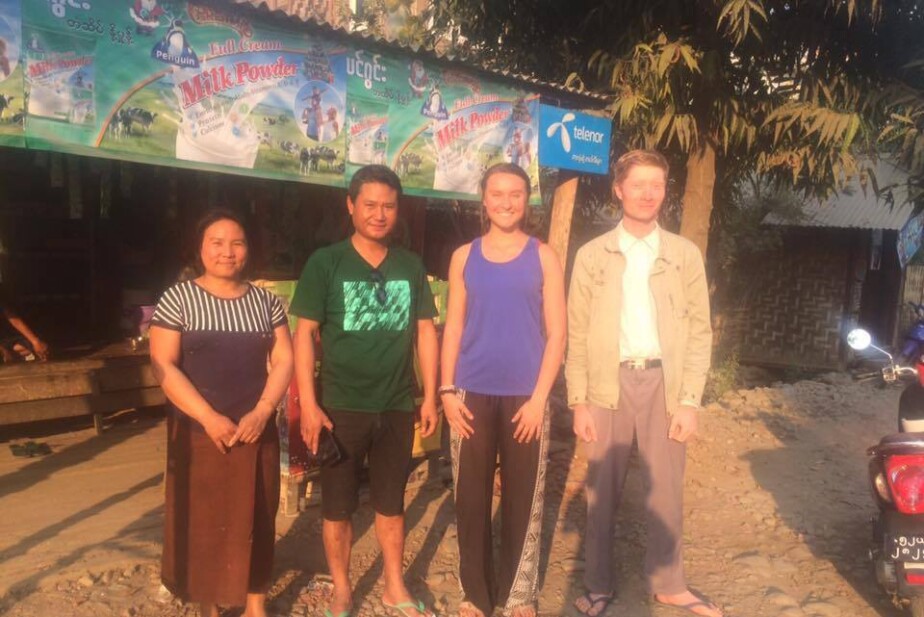
The following post was written by Anna Bennett.
In a few words, Myanmar is almost exactly what I asked for. I wanted to go to one place for six to seven months of my gap year—a place that is considered underdeveloped, a place where I could be completely immersed in the culture, a culture significantly different from my own, and a place where not many people can speak English. It’s a country that just opened its borders about 6 years ago and began implementing some democratic strategies just months before my arrival. The place I found is an orphanage with about 60 children who don’t speak English, located on the outskirts of the Yangon region.
I was permitted to live inside the orphanage, everything free with a room and bathroom to myself. I left my orphanage for one week to visit a small town in the north called Kalaymyo where I stayed with a family friend of Pastor Khai. One day in Kalaymyo, I went for a walk with the four siblings whose house I was staying in. We walked passed a man who looked like a foreigner and the girls pointed him out to me as a man who they have seen a few times before. Apparently this man is an interesting topic of conversation among the local people in Kalaymyo. And that’s saying something, considering Myanmar people do not spread information very well.
“He is a white man with Burmese parents” said Kim Nu, the oldest of the siblings. “Is such a blessing right!?” she said. I obviously had many questions all of which they did not have the answers to. “Well was he born in Myanmar?” I asked.
The girls said that he was, and that he spoke English. Then they asked me if I wanted to go and talk to him to ask him questions myself. In my head it seemed rude and ignorant as a foreigner to just walk up to a Burmese man and ask him questions about why he is white with Burmese parents, but the girls said that the man was very nice and wouldn’t mind at all. I didn’t realize what kind of situation this was until I walked closer to the man. He spoke English very well with me and with the others he spoke perfect Myanmar which really threw me off. But when I looked closely at his features, I finally understood…he had albinism.
The girls were right. He was completely open to talking about his oddities, mainly because he was confused about them himself. I was also surprised by his openness because Myanmar people typically do not like to be different or to stand out from the crowd. I concluded that maybe he didn’t feel so uncomfortable about his situation because Myanmar people like foreigners, and he looks like one. Myanmar people also like white skin, light hair, and light eyes, all of which he has.
I started slowly asking him questions. He told me that he was born in Kalaymyo and his parents and siblings are Burmese but none of them look like him (clue number two). As we were speaking I noticed that his eyes were a bit shaky and unfocused, another symptom to his condition. I was still really thrown off by the fact that he looked like me but he spoke and acted like the people around me, which I realized is the confusion he faces every day. I asked him what he thinks about his condition and he said he is trying to research.
He told me that his parents, who were Buddhist, believe that he had an American family in his previous life and something unclear about reincarnation led to his physical features. I would assume most of the people who know him have the same assumptions about the explanation of his appearance. “Do you have trouble seeing?” he asked me (clue number three). “No,” I responded still pretending to be as fascinated as he was.
I was hesitant and almost completely opposed to bringing up my knowledge of albinism considering the cultural boundaries. However, the man seemed very inquisitive about the true explanation and he mentioned that he was unsure of whether he believed what his parents told him. I asked him if he wanted to know my opinion and he responded with a slight but sudden excitement, insisting on hearing what I had to say. I told him that “I think” he has a condition called albinism but that I am no expert. I told him that it’s not as uncommon to meet someone with albinism in the US. He was completely open to talking about himself, as if he was some kind of alien. It was interesting, since in the US we are very careful about questioning people with “deformities”.
Still, I made sure to talk about albinism by using words like “special” to describe his condition, which is not necessarily the way we talk or think about albinism in the US unfortunately. But I know how easily Myanmar people can feel ashamed or afraid of what others think of them. So I chose my words wisely and only out of heart. He was gracious about the knowledge I was sharing and seemed to accept the information as fact even though I presented it as only a possibility. He was actually very interested in my company and asked to spend the rest of the day with us. From my point of view, it seemed as though my willingness to spend time with him share information was greatly appreciated. I felt as though he viewed me as a kind person, which was reassuring because it is very hard to tell how Myanmar people are feeling and what they think of me despite my unending attempts to make them feel happy and comfortable.
The most fascinating part of this experience was that in a place where almost everyone constantly feels self-conscious, a man—due to his physical appearance—probably feels slightly more confident than most. Whereas the same man in a country of freedom, confidence, and expression would feel unapproachable and unattractive. I am relieved to know that this man receives positive attention from his society. Although it’s not for the most ideal reasons, at least I can leave knowing that I left someone feeling more comfortable in their skin rather than less.
